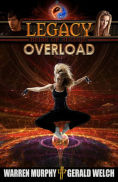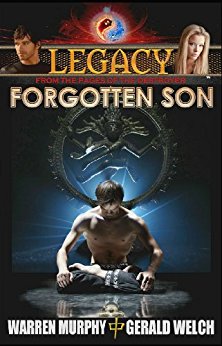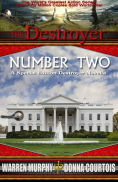WHO’S THAT PERSON STANDING IN THE POETRY CORNER?
Roses are red;
Violets are blue.
I’m schizophrenic
And so am I.
It’s true, you know. Each of us, as writers, has two parts to his brain. The first part is the writing half and it tries, it fails, it tries again, it works always, trying to do, trying to succeed.
And the second half of your brain? That is your editor and all the while you’re writing, it will be whispering in your ear: “What crap. You think anyone will want to read this junk? Who do you think you are? What gives you the right to destroy a lot of trees, making white paper for you to decorate with the mouse droppings you call writing?”
If you’ve written for any period of time longer than two weeks, you know that voice — because you’ve heard it and all too many of you have probably succumbed to it…now or maybe later on, at a time when the writing’s not going well, when you want to cry over it, when you just want to walk away from it forever, because that voice is right: you’ll never amount to anything.
Well, don’t do it just yet. Help is here…if you want it. The way not to get discouraged by that vicious nasty editor of yours is to ignore him. No one says it will be easy but the method is simple: you simply put him out of the room. Your working office is only big enough for one, so make the editor wait in the hall. And don’t let him read your stuff or think about it or comment on it.
One way to do this is to adopt this as your writing method: write fast; write as much as you can; keep going; if you write something lousy, and we all do, write on the next line: “this stinks, fix it later.” And keep going. Don’t stop. Don’t rewrite. Don’t rethink. You don’t need a new story. (After all, you already have a chapter by chapter outline, right? I taught you that weeks ago.) Don’t make corrections. If something’s wrong, just make a mark on the page to note the mistake and just keep going and piling up the pages and one glorious day you will reach the end of your story and write those blessed words: THE END.
Congratulations. You have succeeded. You are now a writer…a novelist if that’s your poison of choice. You have separated yourself from the 98 percent of people who “wanna, are gonna, maybe will, any day now, of course I can”….but who will never ever, ever write a book. You, my dear friend, are not one of them. You are special. You have finally lived up to your mother’s expectations and predictions of success.
But now what? Maybe your manuscript does stink. It happens, you know. So now is the time to fix it and thus it is time to invite your editor-brain back into the room, where he will look at what you’ve just committed and tell you, “This is junk, but since you seem bound and determined to keep going with it, let me give you a hand and show you how to fix it.”
And then your editor will become your best friend. Let him talk, listen to his advice, his commentary. Argue with him sometimes, but mostly agree with him. It’s his job after all. Let him work. He will not always be right but he will be more often right than wrong. Think, dammit, and work. And together you just may finish some work of enduring quality. But never forget that it’s your book. The editor in your head has to wait his turn.
It’s like any other partnership. Somebody’s got to be the boss occasionally. This time it’s you. You’re the writer and the boss. Act like one.
And comb your hair.
IF YOU DON’T READ, YOU CAN’T WRITE…SO, QUIT.
See that guy up there waiting in the checkout line near the cash register? Yes, of course he’s reading. He’s always reading. He’s Stephen King — and yes, to this day, he reads every chance he can get. And if you would emulate him, then start imitating him.
Read other writers, read writers’ magazines, read books about writing, read the editorial pages and find out what’s going on. You never know what you’ll learn or where you learn it. In my early days, I used to have trouble plotting my mysteries. One day I read an article by a woman writer whose name sadly I don’t remember, but she said when writing a murder mystery, always make sure that at least one other character besides the killer, has the means, the motive, the method and the opportunity to be the villain. The light bulb went on over my head; why hadn’t I realized that before?
In a flash, I figured out that I hadn’t been doing that and had mainly stumbled my way to getting my books structured that way. But now I knew the rule, and from then on, every mystery I plotted was basically a piece of cake because at last, I knew what to do…often before I even wrote a word.
So read. You can find stuff like that out there. Keep your eyes open.
What to read? Everything. Writer’s Digest. Every other writer’s magazine you run across. Read the how-to books. If you want to read books on writing, you can’t find much better stuff then Stephen King on Writing, anything by Dean Koontz or Larry Block, a very specific mystery writing manual from Hallie Ephron, Writing Mysteries from MWA, a collection which includes me and my ex-partner, read my blogs and those about the writer’s soul by Molly Cochran. Read “Trial and Error”by Jack Woodford, one of the great commercial writing geniuses. And be sure to read my long time personal favorite book by one of my all time, all-star heroes, “Dare to be a Great Writer” by Leonard Bishop, which is not 300 pages of “rah-rah boys, go do it” but is instead 329 specific tips on how to get the trucks out of the garage in the morning. Fabulous. Reading and writing remember, are the only two of the three R’s that count. Who the hell cares about ‘rithmetic?
Read. Read. Read.
YOU CAN’T TELL THE WINNER WITHOUT A SCORECARD:
Here’s a thought worth considering. When you start to write a book, assign to it a potential score. If you did your planned book to its very limit, what would be its rank?
Maybe if you’re working on the great American novel, the potential is a 96. Or if you do a cowboy shoot-em-up, the potential score might be only 83. Let’s deal with the cowboy book for an illustration: okay, its potential is 83 and you finish a draft and you decide you’ve scored 77. Well, it’s probably worth a rewrite which you commit and now you’ve pushed the manuscript up to an 80. What now? Don’t rewrite again. Settle for 80, and move on to writing your next book.
There is a law in life of diminishing returns and another law of not throwing good time after bad. You’ve gotten out of your manuscript almost everything possible; time to say “good enough” and move on to your next work.
And this time aim higher.
And comb your hair.










Very helpful article! I posted it to my Facebook Wall so obviously I was impressed!!!
The Destroyer Series played a huge role in getting me interested in economics, geography, politics, history, and even in Jewish Mysticism and the paranormal!
Richard Sapir and Warren Murphy have inspired me far more than they might tend to imagine…..Oh….I strongly suspect that some of my ideas on economics were whispered to me by Richard Sapir from the higher dimensions of space – time!!!!